November 27, 2025 | 23:53 GMT +7
November 27, 2025 | 23:53 GMT +7
Hotline: 0913.378.918
November 27, 2025 | 23:53 GMT +7
Hotline: 0913.378.918
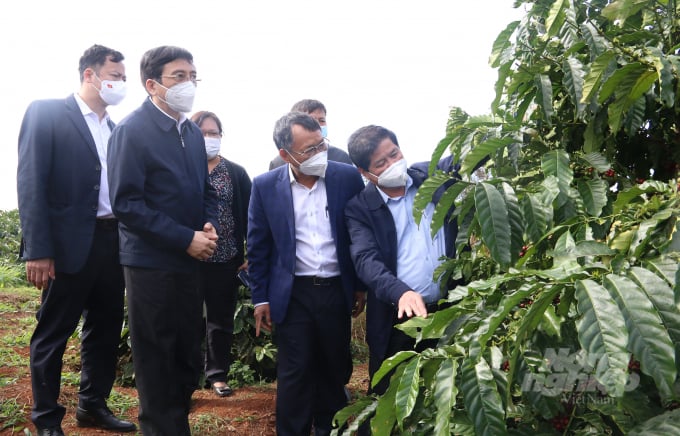
Deputy Minister of Agriculture and Rural Development Le Quoc Doanh visits a coffee model at the Dak Lak-based Central Highlands Agro-Forestry Science and Technology Institute. Photo: Quang Yen.
Deputy Minister of Agriculture and Rural Development Le Quoc Doanh on January 4 chaired a conference of the Sustainable Agriculture Transformation Project in Vietnam (VnSAT). The conference aimed to boost the implementation of the project’s coffee component in 2022 and announce the results of the implementation of technical infrastructure activities relating to speciality coffee and landscape.
The VnSAT project was schemed to be implemented from 2015 to June 30, 2022. According to the results of the implementation of the sustainable coffee development component, from 2015 to now, the Central Highlands provinces have trained 52,461 households in the coffee production process.
Currently, all criteria of the sustainable coffee production process have been applied to a total area of 49,083 ha. By the end of 2021, a total of 29,234 households have been trained on sustainable replanting procedures; 24,088 households have carried out replanting coffee trees with an area of 21,574 ha.
To support the upgrading of seedling nurseries and nursery certification, VnSAT has upgraded the infrastructure of 2 nurseries for the Dak Lak-based Central Highlands Agro-Forestry Science and Technology Institute and the Gia Lai-based Vietnam Tropical Forestry Center of the Institute of Science. Forestry of Vietnam with total funding of more than VND21.3 billion.
The Project Management Board of five Central Highlands provinces has certified the standard nurseries for 51 gardens, supporting the upgrading of 32 nurseries. Since then, the upgraded nurseries have supplied to the market more than 11.6 million quality seedlings for coffee replanting.
From 2015 to now, the Central Highlands provinces have built 110 drip irrigation models and 206 sprinkler irrigation models with the project funds. Households in the project area have self-invested drip irrigation systems on 555 ha and 5,710 hectares of sprinkler irrigation systems on 5,710 ha.
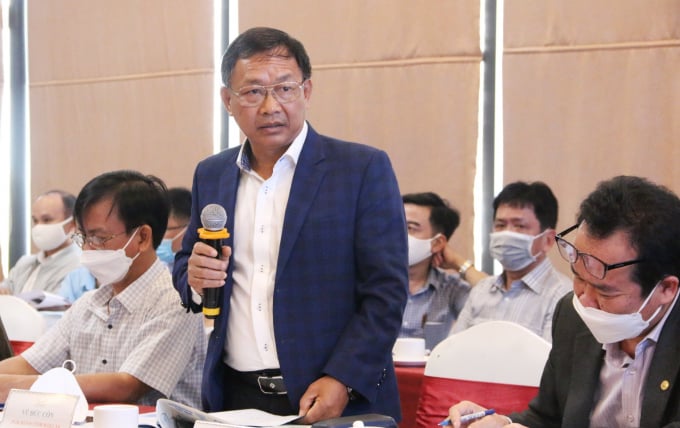
Deputy Director of Dak Lak Province's Agriculture and Rural Development Department Vu Duc Con spoke at the conference.
In terms of infrastructure, the project has supported 42 farmers’ organisations and co-operatives to develop infrastructure and equipment for production with a total capital of VND204.6 billion. During the extension period since January 2021, the Central Highlands provinces have implemented 30 public investment sub-projects with total funding of VND510 billion. Banks have offered loans for 5,327 households to replant 11,465 ha of coffee.
Since the project was started, the total disbursement of five provinces in the Central Highlands has reached VND 698 billion, accounting for 70 per cent of planned funding.
The Central Highlands provinces are expected to spend more than VND242.8 billion this year on implementing the project. The provinces would continue to allocate reciprocal capital for technical activities to maintain the sustainability of project target indicators, build speciality coffee areas and build coffee landscape models, value chains and develop sustainable coffee material areas.
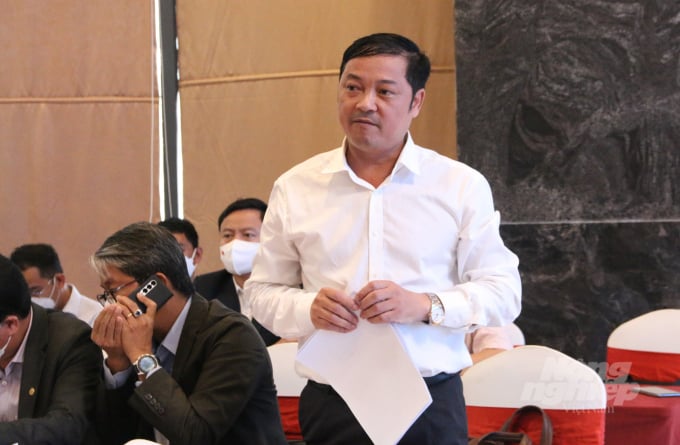
Le Trong Yen, Vice Chairman of Dak Nong Provincial People's Committee, said that the VnSAT project brought many benefits to the people. Photo: Quang Yen.
Le Trong Yen, Vice Chairman of Dak Nong Provincial People's Committee, said that the VnSAT project brought many benefits to the people.
“The province is implementing sub-projects and accelerating the progress of sub-projects so that they could be completed before June 30 when the project closes,” Yen said.
He suggested that VnSAT approve more items that the co-operatives have invested in to improve the efficiency of the sub-projects.
Luu Trong Nghia, Director of Dak Nong Province’s Department of Agriculture and Rural Development, said that the locality achieved all six goals of the VnSAT project with many projects that have completed 300 per cent of planned work.
Local people and authorities appreciated the project very much as it was very helpful to the coffee industry, he said.
“The VnSAT approaches and solve practical problems and issues in localities. Thanks to the project, infrastructure is improved. Models of sustainable coffee, landscape coffee, and speciality coffee were supported to build effectively. The project also increases farmers’ knowledge in coffee replanting. In particular, VnSAT helps the locality to form a chain of consumption, opening a future direction for the sustainable coffee industry", Nghia said.
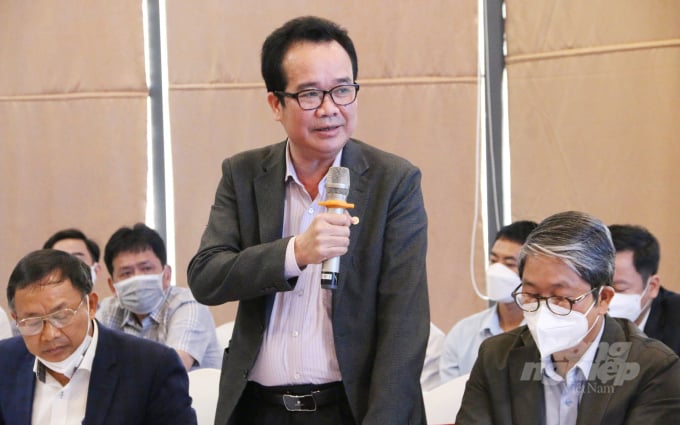
Luu Trong Nghia, Director of Dak Nong Province’s Department of Agriculture and Rural Development Photo: Quang Yên.
Similarly, Y Giang Nie Knong, Vice Chairman of Dak Lak Provincial People's Committee, said that the locality has about 210,000 ha of coffee with an average yield of 26 quintals/ha and an output of about 510,000 tons of green coffee.
With the support and guidance of the Ministry of Agriculture and Rural Development and the VnSAT project, Dak Lak coffee developed more sustainably into the landscape and speciality coffee areas. Accordingly, Dak Lak coffee is produced and processed according to the correct process, and the locality focused on re-cultivation and intensive farming, he said.
Speaking at the conference, Deputy Minister of Agriculture and Rural Development Le Quoc Doanh emphasised that thanks to the implementation of the VnSAT project, Vietnam had developed coffee varieties that resisted drought, having high productivity.
Over the last few years, although the price of coffee has decreased deeply, coffee farming was still maintained, and the yield continued to increase. In particular, in terms of coffee replanting, the Central Highlands provinces implemented methodically and changed new varieties, but the yield did not decrease, Doanh said, adding that the most outstanding result of the project was that sub-projects met or exceed the set plans.
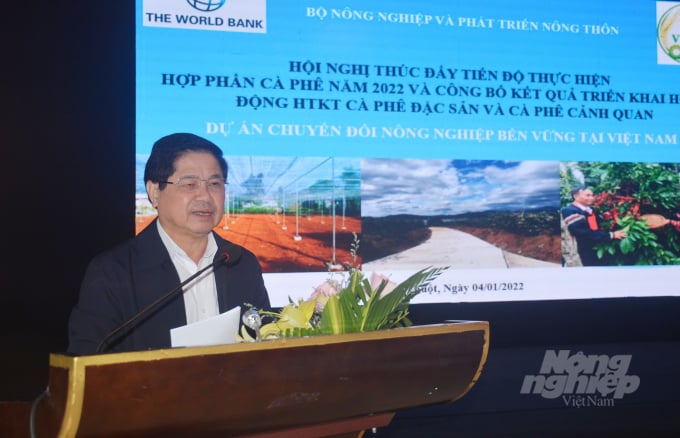
Deputy Minister of Agriculture and Rural Development Le Quoc Doanh addresses the conference. Photo: Quang Yen.
“It is necessary to continue to synchronously deploy project components to integrate with provincial plans, increase added values and promote project efficiency,” Doanh said.
Doanh said that the intercropping of fruit trees with coffee must ensure the economic efficiency of coffee trees.
The provinces speed up the construction of sub-projects, complete the works before June 30, 2022, to ensure the project quality and the efficiency of investment to avoid waste and loss.
Deputy Minister of Agriculture and Rural Development Le Quoc Doanh highly appreciated the Vietnam Agriculture Newspaper for its effective communication about the VnSAT project. The newspaper has published articles and reports on the effective models under the project, which helps the project spread and succeed.
Translated by Hien Anh

(VAN) According to Mr. Vo Minh Thanh, Director of the Tay Ninh Department of Agriculture and Environment, Resolution 57 has created a new development pathway for the locality, shifting from traditional toward modern agriculture.
/2025/11/26/4909-2-154329_878.jpg)
(VAN) Pearl grouper farming in HDPE cages not only delivers economic efficiency but also contributes to protecting the environment, creating jobs, and promoting marine-based experiential tourism.

(VAN) The model of making a living under the forest canopy through the agroforestry system in Van Son commune, Bac Ninh province, is expected to generate an annual income of approximately VND 30 million/ha.

(VAN) Many enterprises in Can Tho are harnessing natural energy and reducing greenhouse gas emissions in their production processes, thereby contributing to the promotion of a sustainable green transition.
/2025/11/24/3536-2-112800_176.jpg)
(VAN) Dong Nai now has tens of thousands of hectares of forests certified for sustainable management, and this area will continue to be expanded in the coming period.

(VAN) Vinh Ha hamlet (Dai Xuyen commune, Hanoi) is shifting away from small-scale farming as households adopt bioscurity into their breeder chicken models.

(VAN) Heavy rains make aquatic species more vulnerable to disease. Proactive water management and high-tech systems help farmers prevent outbreaks and protect yields.